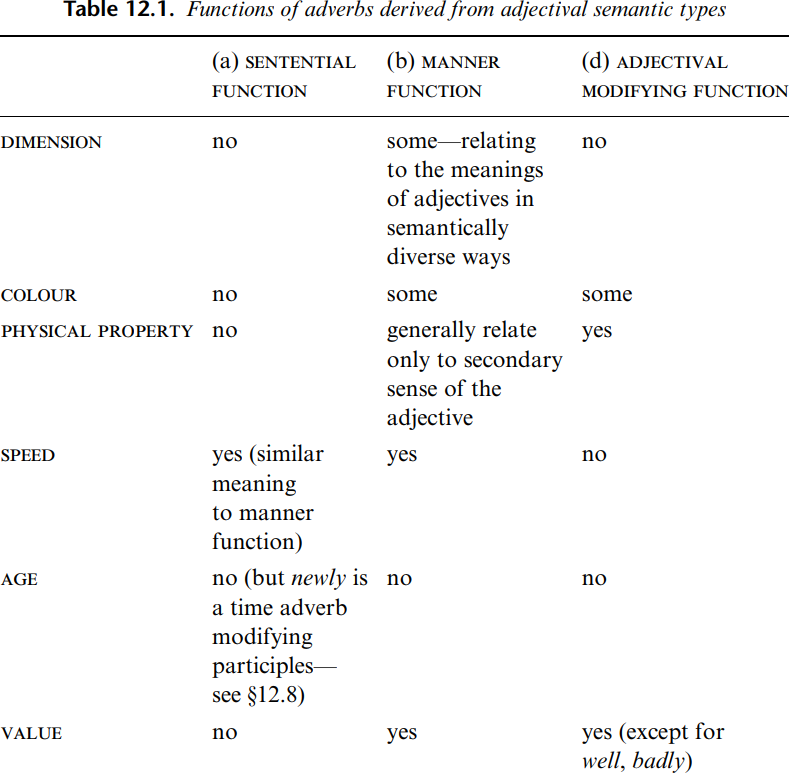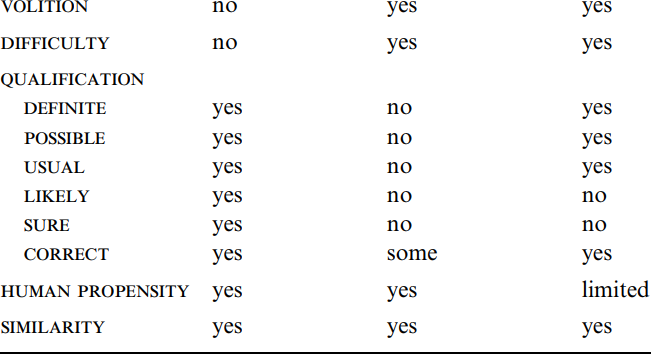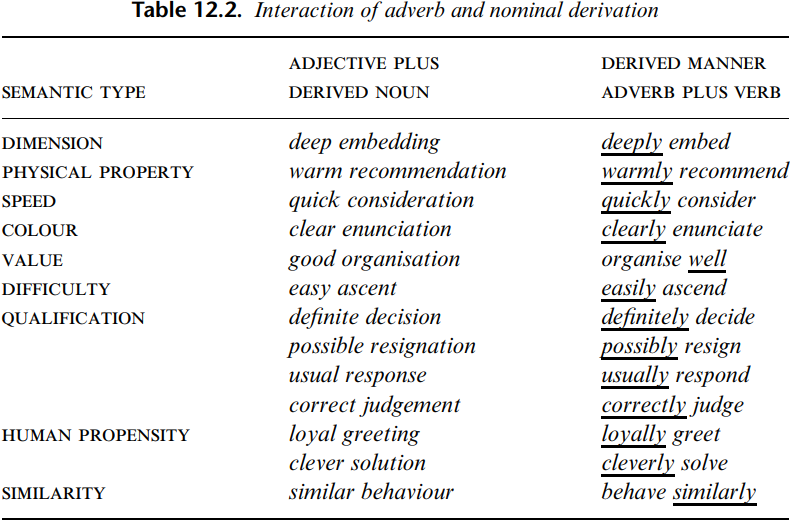


 Grammar
Grammar
 Tenses
Tenses
 Present
Present
 Past
Past
 Future
Future
 Parts Of Speech
Parts Of Speech
 Nouns
Nouns
 Verbs
Verbs
 Adverbs
Adverbs
 Adjectives
Adjectives
 Pronouns
Pronouns
 Pre Position
Pre Position
 Preposition by function
Preposition by function 
 Preposition by construction
Preposition by construction
 Conjunctions
Conjunctions
 Interjections
Interjections
 Grammar Rules
Grammar Rules
 Linguistics
Linguistics
 Semantics
Semantics
 Pragmatics
Pragmatics
 Reading Comprehension
Reading Comprehension|
Read More
Date: 2023-03-25
Date: 2023-06-23
Date: 2024-08-16
|
Adjectives do not all behave alike with respect to the derivation of adverbs by suffix -ly. There is a principled basis, which is determined by the semantic type of the adjective. We will provide an outline summary of the possibilities for each adjectival semantic type forming adverbs in (a) sentential function, (b) manner function, and (d) adjectival modifying function. Note that no adverbs derived from adjectives (with maintained meaning) may felicitously modify an NP (function (c)). Only adverbs derived from VALUE adjectives and similarly and deliberately may readily modify adverbs (function (e)). Here I mention a few of the semantic characteristics of de-adjectival adverbs.
There is one restriction which should be mentioned. An adjective which is derived from a noun by the addition of -ly cannot, in Standard English, form an adverb by the addition of a further -ly. That is, there is no adverb corresponding to adjectives such as friendly and cowardly; one simply has to say in a friendly/cowardly way/manner/fashion.
Adverbs derived from the HUMAN PROPENSITY, SPEED and SIMILARITY types score ‘yes’ for the manner and sentential columns. The contrasting semantic effects of the functions are illustrated and explained. All QUALIFICATION items have sentential function (and many also adjectival function) but most lack manner function. The remaining semantic types occur in manner (and some also in adjectival function) but generally not in sentential function.
Almost all members of the PHYSICAL PROPERTY type, and some from COLOR, have derived adverbs but the adverb most often corresponds to a secondary, metaphorical sense of the adjective. Thus, hotly refers not to temperature (as in hot tea) but to temperament (as in hot temper) and bitterly not to taste (as in bitter chocolate) but to attitude (as in bitter dispute). Many of these adverbs are mainly used with SPEAKING and THINKING verbs—hotly deny, coldly assert, dryly remark, warmly invite, coolly consider, sweetly request, sourly reject, bitterly complain, and—with a COLOR item—darkly frown.
A number of DIMENSION adjectives—such as big, small, little—do not form adverbs. For some others, the adverb relates to the result of an action: He sliced the bread thinly indicates that he produced thin slices. Adverbs narrowly and broadly relate to a metaphorical sense of the adjective, like PHYSICAL PROPERTY items, as in narrowly conceived and broadly intended. Deeply has both a concrete sense (dive deeply) and a metaphorical one (think deeply). The adjectives short and long have a secondary sense relating to time (short meeting, long interval); adverbs shortly and lengthily (the latter being based on the adjective lengthy, from noun length, from adjective long) are time adverbs


In essence, an adjective (or the sense of an adjective) which relates to an objective or (semi-)permanent property is unlikely to form an adverb. An adjective (or the sense of an adjective) referring to people’s skill and ability, and to types and degrees of success, is a good candidate for adverbialization.
A fascinating property of English is that a manner adverb derived from an adjective is used with an underived verb, but the underlying adjective is used with a nominal derived from the verb (an action nominalization). In the middle column, the adjective must precede the noun. For the right-hand column, the adverb has generally been placed before the verb but it could, equally acceptably, follow—deeply embed or embed deeply, warmly recommend or recommend warmly. Only for the main VALUE terms, and for SIMILARITY, do we find that the adverb must follow the verb.
It will be seen that either the modifier is derived and the head non-derived or the modifier is underived and the head derived (in the middle column). All of the adverbs are derived by means of suffix -ly, save for the suppletive well. The derived nouns involve a variety of processes: suffixes -(at)ion, -ing, -ment and -our, besides changes ascend to ascent and respond to response. There are, in addition, some items which have the same form for noun and verb; for example, a generous laugh/laugh generously, a rough copy/roughly copy.

A smallish set of English adjectives can or must, when used in copula complement function, govern a following NP (or, sometimes, a subordinate clause) which is marked by a preposition. For adjectives from the HUMAN PROPENSITY type, a following preposition-plus-NP is optional, as in:
(7a) She is angry (at the customs official)
(7b) He is jealous (of his rival)
(7c) She is curious (over/about what is happening next door)
The -ly manner adverbs derived from these adjectives do not govern a preposition-plus-NP. Consider:
(8a) She behaved angrily (*at the customs official)
(8b) He acted jealously (*of his rival)
(8c) She looked curiously (*over what is happening next door)
These clauses can be followed by preposition-plus-NP, but the nature of the preposition is determined by the verb used, not by the adverb. That is, one can say She behaved angrily towards the customs official (but not, with the corresponding adjective, *She is angry towards the customs official), or He acted jealously towards his rival (but not *He is jealous towards his rival), or She looked curiously at what is happening next door (but not *She is curious at what is happening next door).
There are other adjectives for which a following preposition-plus-NP is obligatory. These belong to the SIMILARITY type. Examples include:
(9a) Jane is similar to her mother
(9b) Tom is different from his father
(9c) Michael is independent of his parents
(9d) This question is separate from that one
When a governed argument is obligatory for an adjective, it is also obligatory for a manner adverb derived from that adjective. For example:
(10a) Jane behaves similarly to her mother
(10b) Tom reacts differently from his father
(10c) Michael lives independently from his parents
(10d) This question must be debated separately from that question
It is of course possible to omit the preposition-plus-NP from any of (10a–d) as it is for any of (9a–d) in an appropriate discourse context. Thus, if in a discussion about Jane’s mother and her behavior, someone then mentions Jane, it could be permissible to say either Jane is similar or Jane behaves similarly, with the other participants in the conversation understanding from the context that to her mother is implied. That is, a governed preposition-plus-NP must be explicitly stated or implicitly understood for (10a–d) in the same way as for (9a–d). In contrast, the adjectives in (7a–c) may optionally govern a preposition-plus-NP, but this is not available for adverbs based on them in (8a–c).
|
|
|
|
لصحة القلب والأمعاء.. 8 أطعمة لا غنى عنها
|
|
|
|
|
|
|
حل سحري لخلايا البيروفسكايت الشمسية.. يرفع كفاءتها إلى 26%
|
|
|
|
|
|
|
جامعة الكفيل تحتفي بذكرى ولادة الإمام محمد الجواد (عليه السلام)
|
|
|